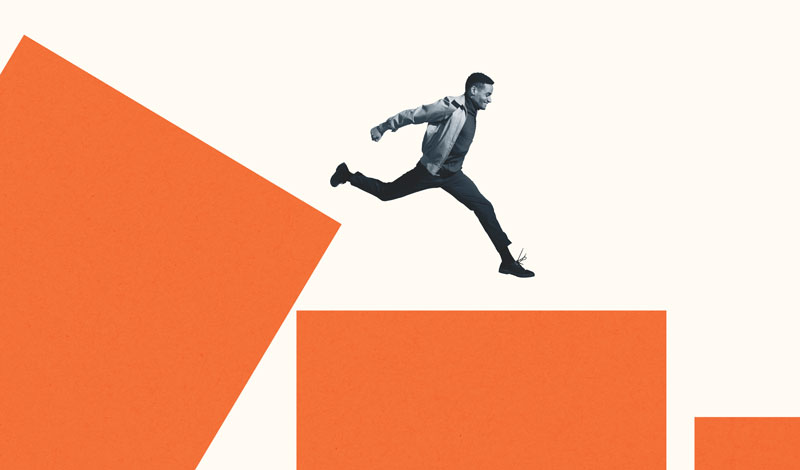Simmering disagreements, long-held rivalries, all-out wars—such are the remnants of the holiday family get-together whose fallout lingers into the new year. The most cynical among us might shrug and say, “Well, you can’t choose your family.” But what if our relationships with the people who’ve shaped us are more changeable than we think? What if, despite years of history, habits and old wounds, we could still transform them—if only we had the courage?
You could say that transforming family relationships is one of the fundamental aims of Buddhist practice, as outlined by the first of the five eternal guidelines of the Soka Gakkai: “Faith for a harmonious family.” When second Soka Gakkai President Josei Toda presented the first three guidelines in December 1957, he sought to clarify the kind of faith members should aim for to become absolutely happy: “The family is the foundation for society. And faith for a harmonious family is the power source for building a strong family. Such faith is an indispensable condition for the happiness of individual families and the flourishing of society as a whole” (The Five Eternal Guidelines of the Soka Gakkai, p. 4).
However, transforming family relationships requires more than just changing your mind. It takes courage—the kind that allows you to feel vulnerable—like your heart’s exposed. It’s about confronting old patterns or deeply held beliefs, breaking cycles and doing the hard work of checking what’s really going on in your heart.
In this article, we’ll explore transforming family ties based on faith. As hard as it may be, some of the most powerful acts of courage aren’t about confronting the world outside but about healing the connections that bind us.
But first, let’s talk about courage, an essential requirement for becoming happy.
Courage: What is it?
Courage, often associated with heroic acts, can seem like a quality reserved for the few who were lucky enough to be born with it. But courage is actually something more subtle. Courage is the decision to act in the face of fear, uncertainty or discomfort.
Buddhism teaches that everyone has it—it’s just a matter of accessing it and bringing it forth. Nichiren Daishonin established an easy and straightforward way to do so—by chanting Nam-myoho-renge-kyo.
He talks about the importance of courage in attaining Buddhahood in his letters, writing to his disciple Hyoe no Sakan Munenaga, for instance, to muster courage in the face of his father provoking him to trade his faith for the right to the family’s estate and legacy. Nichiren tells him: “You should not have the slightest fear in your heart. It is lack of courage that prevents one from attaining Buddhahood” (“The Three Obstacles and Four Devils,” The Writings of Nichiren Daishonin, vol. 1, p. 639).
Ikeda Sensei, likewise, has written at length about the kind of courageous faith it takes to lead a happy life, writing: “We must always ask ourselves, do we at this moment have courage in our hearts? Courage is the foremost requirement for leading a victorious life” (Champions of Hope, p. 13); and “Courage and strong faith go hand in hand. Likewise, cowardice and doubt are connected at the deepest level” (The World of Nichiren Daishonin’s Writings, p. 154).
So, what kind of courage is necessary to tackle the challenging relationships between family members? Here are three.
1) The Courage to Face our Reality
Sometimes it’s easier to avoid the person who has caused us suffering or lock away the deep pain or anger caused by a family member. But suppressing those emotions won’t heal our wounds. When we push them further down, we often fail to address the things we need to face to become truly happy.
Nichiren states in a letter to his follower, “Hell is in the heart of a person who inwardly despises his father and disregards his mother” (“New Year’s Gosho, WND-1, 1137). Regarding this passage, Sensei said:
Naturally, there are all kinds of relationships between parents and children, and simply carrying out the traditional virtue of honoring one’s parents—filial piety—isn’t the solution to every problem. But the fact remains that without our parents, we would not exist in this world. Harboring unreasonable animosity toward the parents who gave birth to and lovingly nurtured us could lead to undermining the very foundation of our existence and negating the value of our own precious lives. If we lose that foundation, we could also end up losing our sense of self-worth and meaning, our self-confidence and hope. Nichiren warns that this fundamental form of suffering represents the world of hell and that it is a basic cause of unhappiness. (November 2014 Living Buddhism, p. 27)
Deciding to transform difficult and complex feelings toward family members is not as much about the other person as it is about us. But how do we even begin to challenge something like this? As with all things, this, too, begins with our determined prayer to the Gohonzon. Sensei said:
The Gohonzon is the manifestation of the Buddha endowed with infinite compassion. We should therefore go ahead and chant about our desires, our problems and our aspirations, just as they are. When we’re suffering, feeling sad, or experiencing hard times, we should just go to the Gohonzon with an open heart, like an infant who throws himself into the arms of his mother and clings to her. The Gohonzon will “listen” to our every word, so we should chant abundantly as if we are carrying on a conversation, confiding our innermost thoughts. In time, even hellish sufferings will vanish like the morning dew and seem as but a dream. (The New Human Revolution, vol. 11, p. 106)
2) The Courage to Take Ownership
SGI members often talk about owning our suffering or taking responsibility for a situation. This doesn’t mean assuming blame or fault but rather doing what it takes to transform the situation.
A story in volume 6 of The Wisdom of the Lotus Sutra paints this picture vividly. Chieko Yamashita suffered from abuse at the hands of her husband, who, failing in business after World War II, started drinking and gambling heavily. This led to a tumultuous relationship between her and her husband, marked by abuse and financial hardship. In such dire straits, Yamashita joined the SGI. Seeking guidance from a senior in faith, she was told that she was the one who must ultimately take responsibility for her own happiness: “Unless you change, you cannot accumulate good fortune” (WLS-6, 184), they told her.
Yamashita summoned a determination:
When I heard this, I made up my mind to not give up. The Daishonin says, “Buddhism is like the body, and society like the shadow. When the body bends, so does the shadow” (“A Comparison of the Lotus and Other Sutras,” WND-1, 1039). I determined to stop swinging between joy and sorrow because of the chaos in my life and to stop complaining about what my husband was or wasn’t doing. I decided that since this was my karma, I would take responsibility for overcoming it myself. I would accumulate good fortune. I realized that it was not about anyone else; everything depended on my life condition. (WLS-6, 184–85)
Sensei commented:
Once we understand that everything that happens to us enables us to attain Buddhahood in this lifetime, all of our problems will be resolved.
On the other hand, the more we tend to complain and put the blame on others, the longer we delay the transformation of our karma.
If we pray to the Gohonzon through all our sufferings and sorrows and firmly resolve that: “This is my destiny. This is my life. I will do my human revolution first and foremost,” then a path forward will open without fail. (WLS-6, 185)
In Yamashita’s case, this new determination gave rise to resolute prayer. And her prayer resulted in her developing sympathy and appreciation for the role her husband played in her life. As soon as her resentment turned into appreciation, his gambling stopped, and he began chanting to the Gohonzon. She completely transformed both her relationship with her husband and her financial fortune through a determination to take full responsibility for her own happiness.
It’s easy to wonder why we have to transform something when we feel we haven’t done anything wrong, but this mindset only prolongs our suffering. Deciding, This is my karma! I will transform this! is the starting point for real change.
3) The Courage to Persevere
When the going gets tough, Buddhists strengthen their resolve. As courageous Bodhisattvas of the Earth, we have what we need to persevere: the Gohonzon, our mentor’s guidance and our friends in faith, with whom we share eternal bonds. Sensei says that by chanting Nam-myoho-renge-kyo and summoning courage to transform our situation, we can expand our state of life and “undoubtedly come to realize that each person in our family is a ‘good friend,’ or positive influence, in our lives” (Youth and the Writings of Nichiren Daishonin, p. 180).
The experiences in this issue by Carol Weiss (p. 17) and Manny Freeman (p. 19) testify to the profound transformations that are possible with courageous faith.
On the path to harmony, setbacks are a given. For us, they are simply opportunities to return to the Gohonzon, refresh our determination and find a new way forward. Regarding perseverance, Sensei wrote that only steady efforts open the door to victory, and he suggested that we make our motto “The next step is key! Let’s keep pressing forward!” (March 3, 2023, World Tribune, p. 3).
The Courage to Face Myself
Carol Weiss / Madison, WI
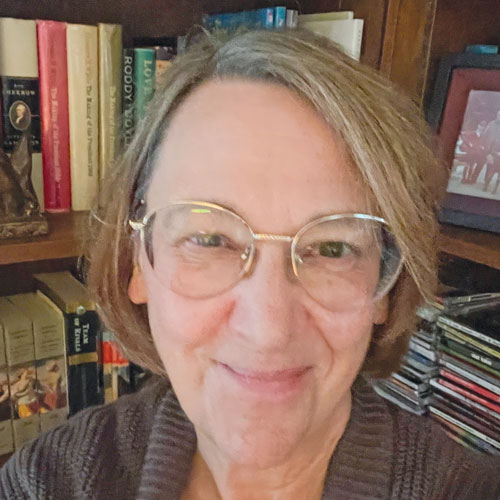
Living Buddhism: Carol, thank you for talking with us about transforming family relationships. While family relationships can be the most rewarding, they can also be the most difficult to challenge. Before we begin, can you tell us how you started practicing Nichiren Buddhism and a little about your family?
Carol Weiss: Yes, I was introduced to Nichiren Buddhism by my sister and began my practice in 1975, when I was 18. My sister and I come from a dysfunctional family, in which we experienced a lot of pain. We decided that the generational addiction and abuse would stop with us. And it did, thanks to our Buddhist practice.
In 2007, after seeing profound changes within me, I decided to divorce my first husband, the father of my children, after nearly 20 years of marriage. Just two years later, I met Jay. We have called each other “our deeply compatible human” since our second date, and in almost every sphere of our lives, my relationship with Jay is actual proof.
The one significant challenge in our relationship was that, from the beginning, Jay’s daughter refused to have anything to do with me. After meeting me for the first time when she was 24, she stopped speaking to her dad for six months. For 12 years, Jay’s daughter refused all contact with me. It was truly painful.
What did your interactions look like and what made it most painful?
Carol: When we had family gatherings, she would go in the other room, or if I said, “Hello,” she would turn around and not answer. I tried to transform it in the beginning, determined to turn poison into medicine, but as the years went by, I lost hope that our relationship could improve.
I mainly felt ashamed that as a longtime Buddhist who prides myself on finding a way to get along with anybody, I couldn’t find a way to change this relationship.
So, what eventually did change?
Carol: About two years ago, my stepdaughter decided to become a single mother by choice. When she announced her pregnancy, our estrangement became a crisis!
As a mother who had raised two children of my own, I felt in my bones that she needed her people. She would need family support, but with the reality of the situation, I feared that down the road this would become a real wedge in my marriage. My husband was going to be a grandpa no matter what. I couldn’t fathom how one person in a couple could be a grandparent but not the other.
Based on this new sense of urgency, my husband and I decided to go to therapy, and I also decided to get faith guidance about my relationship with his daughter, something I hadn’t done until this point. At bottom, I was ashamed that my faith had not been strong enough to develop a harmonious family, the first of the Soka Gakkai’s five eternal guidelines!
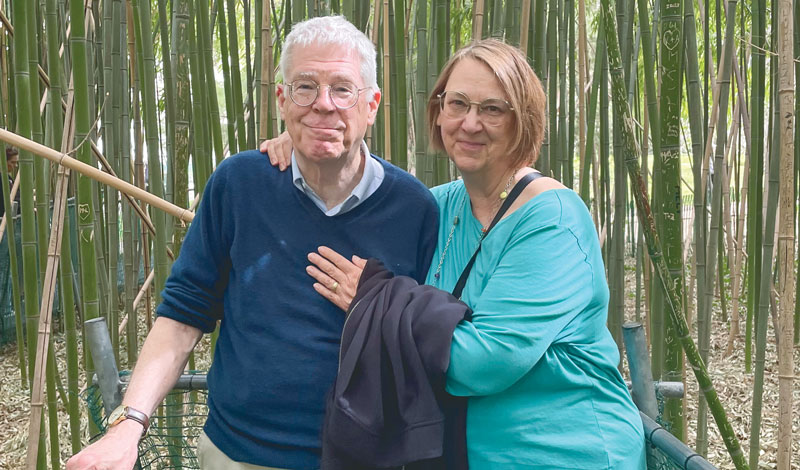
What happened then?
Carol: The guidance session empowered me to take full responsibility for the situation which, up until then, I had not done fully. Specifically, I was encouraged to take ownership of my pain, to determine to bathe her life in daimoku and to pray until I could feel deep gratitude for this relationship.
I started to reflect on what was going on in my heart. In my mind, the word grudge is associated with wishing someone harm. But I realized that the way I held grudges was to hold on to the ways that I’d been hurt. I was nursing a big pile of hurt. For over a decade, I had been replaying the times she turned her back on me, or when she did this thing to me in front of the family that hurt me. Without realizing it, I was playing victim to my circumstances.
I decided in front of the Gohonzon: The day would come when she would trust me enough to hold her baby.
One day, I shared this with my sister-in-law, who laughed out loud and reminded me: “Carol. She won’t talk to you. She’s not going to hand you her baby.”
But I chanted. Every time I felt negativity or hurt, I would instead choose to embrace her and her baby with unconditional love. That’s real human revolution, right—deciding, I’m going to face it, and I’m going to become somebody different. I firmly believe that things changed because of a shift in my heart.
And the rest is history?
Carol: Not quite. Sometimes you are tested right before you break through. My test came in the form of her reconfirming with my husband, just one week before her delivery, that she didn’t want anything to do with me and didn’t want me around the baby. I was discouraged and I, again, wondered if things would ever change.
My stepdaughter had a tough delivery. During her labor, my husband asked me to chant. I went downstairs to my altar, and I chanted until I could feel that I was genuinely chanting for her from my heart.
This is where things happened that I can only attribute to the power of daimoku.
Six days after the birth, Jay and I got a call at midnight. I could tell he was talking to his ex-wife and braced myself to hear that he was needed, and I was not wanted. But instead, he said his ex was taking his daughter to the emergency room, that we were both needed to care for the baby.
When we arrived at my stepdaughter’s, she thanked me, introduced me to her newborn son and showed me where everything was. When she returned three hours later, she walked in the door with her mom, took one look at me and fell sobbing into my arms.
I held her for several minutes and reassured her that she was going to be fine and there were many people who wanted to support. With that, the years of pain that we both held on to melted away. She needed a surgery when her baby was 2 weeks old, and, just as I had envisioned in my prayer, she handed him to me before she left for the hospital. That was such a moment of victory for me.
Courage is needed to become happy and transform our lives. What role did courage play in this experience?
Carol: It was very easy to craft a worldview in which I was mistreated, and she was the one who needed to change. But this attitude left me suffering.
I needed courage to really face myself. I needed courage to decide: I am going to do whatever it takes to change it. As a Buddhist, am I willing to really look at my ugly parts, to face my own mirror? To me, that willingness is fundamental to human revolution.

What an incredible breakthrough. A Cornell University professor wrote that 27% of Americans over the age of 18 were estranged from a family member in 2020. Do you have advice for people trying to change their family relationships?
Carol: It’s a huge issue. In society, there is a trend to cut off people who are toxic and to maintain boundaries to protect yourself from hurt. But I knew that those things alone would not allow me to deeply transform this relationship and my life state.
As Buddhists, we take full responsibility for everything in our lives. This doesn’t mean you’re responsible for the actions of the individuals in your family, but if it’s going to change, you have to put your hand up and say, “I’ll be the one.”
Fundamentally, taking full responsibility happens in front of the Gohonzon. There’s no strategy of saying the right thing at the right time. Rather, it’s to continue to pray with the same determination until you turn around and it’s different. You feel different. They feel different. There’s harmony. It was more than just other people seeing my growth. I experienced people responding to my prayer.
Changing our family relationships is the first step in the chain of world peace. When we can shift our own hearts to create harmony, we can have confidence in the SGI’s mission that peace through human revolution is possible.
What a Buddha Does
Manny Freeman / East Orange, New Jersey
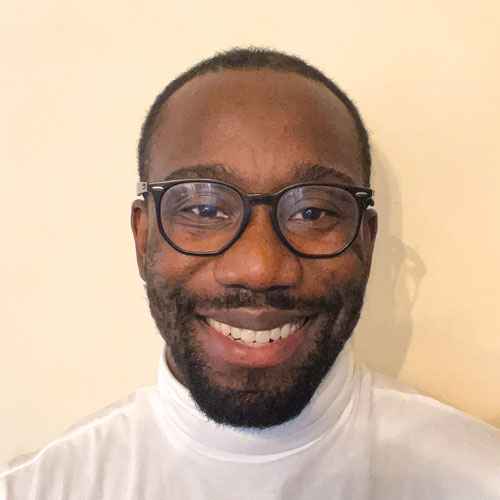
Living Buddhism: Thank you, Manny, for speaking with us today. You mentioned that, since you began practicing Buddhism in 2015, you have transformed your relationship with your parents. What was your relationship with them like growing up?
Manny Freeman: Looking back, I see that I probably gave them a hard time.
Both of my parents worked and did their best to spend time with me and my two older sisters. My dad, however, worked a lot, so the bulk of our time was spent with our mom. As a result, my mother and I were close. My father and I, not so much, but we will get into that later.
When I started practicing Buddhism, my mother, who was devout in her religious faith, immediately rejected my practice. The week that I joined the SGI, she came to an introduction to Buddhism meeting and got into a spirited dialogue with a leader about Buddhism and God. Needless to say, she wasn’t happy with the fact that I was Buddhist.
But I was happy. I was seeing actual proof of chanting Nam-myoho-renge-kyo. Chanting gave me tremendous hope and empowerment for the first time.
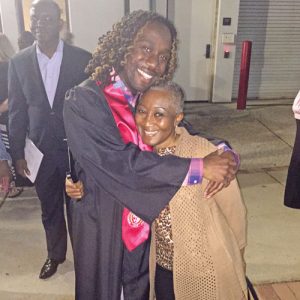
How did her opposition to your faith affect you?
Manny: It felt like I was coming out to her for the second time. The first was when I told her I was queer. It took her a few years to deal with that. And then I told her I was a Buddhist. Her response felt like, Why do you always have to defy me?
How did you respond?
Manny: My response was self-righteous. I knew Buddhism was good for me, and I felt like she was wrong. Even though we had a close relationship, our challenge was communicating with each other respectfully. It exacerbated our root issues.
So, I went to seek guidance from a senior in faith, expecting for them to agree with me. To my surprise, they didn’t. They simply asked me: “Do you want to be right, or do you want to create value?” I was also encouraged to show my mother proof of the greatness of my Buddhist practice through my life.
That’s not what I wanted to hear. But Buddhism is about taking accountability for your life. So I asked myself, What do I need to change in my life? I decided I would do my human revolution, whatever it was.
What happened after that?
Manny: I made causes. I participated in SGI activities, including supporting SGI activities behind the scenes as a member of Gajokai and Soka Group, the young men’s training groups. I truly feel that working on behalf of others allowed me to break through my lesser self that is ego-driven.
It took time, but our relationship started to change. We started communicating differently with each other. For example, if one of us said something that was hurtful, we were quick to apologize and take full ownership. There was also a shift in her support of my practice. She started allowing me to take her car to get to my SGI activities.
Our relationship now has dramatically improved. Since 2017, my mother has attended meetings in my local district, become good friends with the women’s division and now views the SGI as a positive influence. A big part of gaining my mom’s trust was learning to respond to her out of a place of respect versus wanting to be right.
I have come to deeply appreciate and respect my mother and her faith. I learned from her how to carry through with faith like flowing water, and to never regress no matter what I am going through.
That’s truly beautiful. You have created such value out of that situation. Can you share about your relationship with your father?
Manny: My father passed away suddenly when I was 14. Up until that point, I had been seeking his love and approval and vying for his attention even though he was at times emotionally, verbally and physically abusive. I was often compared to my cousins and asked why I didn’t do as good as so-and-so. I was in a detrimental cycle of comparing myself to others and being envious of them, never feeling good enough.
Over the years, I fluctuated between mourning his loss and feeling deep hatred and anger for the trauma he inflicted. I eventually removed him from my silent prayers, believing that his name did not deserve to be brought up in front of the Gohonzon during prayers for the deceased.
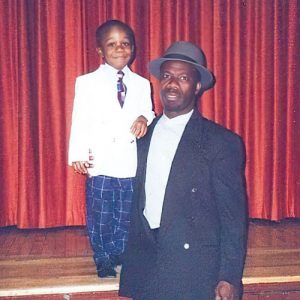
How did this affect your other relationships?
Manny: I was constantly looking for people to acknowledge me, so I could feel worthy of love. The bar I held for myself was so low. Ultimately, I had no respect for myself.
What changed?
Manny: Last year, I was supporting a conference at the SGI-USA Florida Nature and Culture Center in Weston, Florida. I was preparing for the Gosho lecture but had a hard time getting into it. As I chanted to connect with Ikeda Sensei’s lecture, I found myself chanting about my dad. By that time my dad had been gone for 16 years, but as I chanted, I felt uncomfortable, like I was touching a nerve. All these feelings I had suppressed started coming to the surface. I was like: Oh gosh, this is not good.
A senior in faith encouraged me to chant for everyone to deepen their faith, by connecting to the Gosho and Sensei’s heart. Once I knew that my human revolution would encourage others, I could go to the uncomfortable place in my prayer.
I learned that if something feels uncomfortable, that is usually where my human revolution lies. I knew that if I didn’t transform this karma, I would continue to suffer for the both of us. I decided this karma would end with me. Sensei says:
The great benefit of our Buddhist practice dedicated to kosen-rufu also flows on to the deceased as well as to unborn future generations.
The past doesn’t matter; it’s the present that counts. Our ancestors’ actions are not decisive; it is our actions that determine the future. All it takes is one awakened individual to shine like the sun and illuminate all of his or her family members and relations with the light of the Mystic Law. (The Wisdom for Creating Happiness and Peace, part 1, revised edition, pp. 341–43)
Once I chanted through the rage, sadness and hurt, I realized that my dad experienced his own traumatic upbringing and did not have the practice of chanting Nam-myoho-renge-kyo. But I did. I felt appreciation for my father for doing the best he could.
My experiences with my father enabled me to forge my heart and compassion for people, and I could break the cycle of trauma so that future generations would not repeat it. The pain had its purpose. Now I regard my father as my greatest teacher for awakening me to my mission for kosen-rufu, which is to help others acknowledge and bring out their greatness through our Buddhist practice.
What a profound realization. Any final thoughts?
Manny: Family relationships are probably the most challenging. But I didn’t choose to practice Buddhism because it was going to protect me from pain or the things that were uncomfortable. I chose to practice because it would give me the courage and the faith to move through difficult things and grow from them. I’m trying to change my life in the most radical way, and I can’t do that if I keep doing the same stuff I was doing before.
If you are going through something similar, stay in it and take the challenge on to transform your family. And here’s the thing: If the other person doesn’t shift or their heart doesn’t change, yours will. And your heart is all that is needed to change, to break through your karma. It’s a great undertaking, bringing people—your family—together. But that’s what a Buddha does.
You are reading {{ meterCount }} of {{ meterMax }} free premium articles

